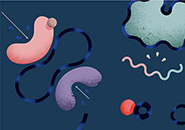Neanderthals may have died out tens of thousands of years ago, but they live on in our DNA. When early humans migrated out of Africa, they encountered, and mated with, some of their Neanderthal cousins. As a result, many people today have about 2 percent Neanderthal DNA in their genomes. David Reich, an HHMI investigator at Harvard Medical School, recently led a team that sleuthed which modern genes can be traced back to these ancient trysts.
The researchers compared DNA from a Neanderthal woman’s remains discovered in Siberia to DNA from 1,004 present-day people. “The goal was to understand the biological impact of the gene flow between Neanderthals and modern humans,” says Reich. “We reasoned that when these two groups met and mixed, some new traits would have been selected for and remained in the human genome, while some incompatibilities would have been selected against and removed.”
Some of the DNA that endured the test of time left its mark on our hair and skin. Reich and his colleagues discovered that a number of the Neanderthal genes that exist in people today are involved in making keratin, a fibrous protein that lends toughness to skin, hair, and nails. Reich speculates that the Neanderthal versions of these genes may have helped humans adapt to non-African environments by producing thicker hair and skin to withstand a colder climate or to shield the humans from pathogens.
The study, published January 29, 2014, in Nature, also indicates that Neanderthals and early humans were “at the very edge of being biologically compatible,” Reich says. The team found little Neanderthal DNA in the human X chromosome or in genes that are normally highly expressed in testes. This pattern is often linked to a phenomenon called hybrid sterility—when two organisms are distantly related, their male offspring can be rendered infertile. Thus, modern males who inherited a Neanderthal X chromosome may not have passed along that X chromosome to offspring.
Reich and his colleagues also discovered that some genes associated with a risk of lupus, diabetes, and Crohn’s disease most likely originated in Neanderthals. The group’s findings may help scientists glean more information about human disease genes, Reich says.









